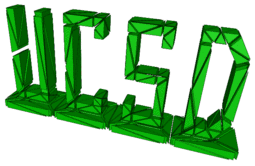| Michael Holst | ||
| https://ccom.ucsd.edu/~mholst/ |
Distinguished Professor of Mathematics and Physics UC San Diego |
|
|
Bio and CV
Here is Michael Holst's long-form Curriculum Vitae. A short bio is below.
Michael Holst
Chair, Department of Mathematics, UC San Diego, 2023-Present.
Distinguished Professor, UC San Diego, 2020-Present.
SIAM Fellow, 2016-Present.
Chancellor's Associates Endowed Chair VIII, UC San Diego, 2012-Present.
Co-Director, Center for Computational Mathematics, UC San Diego, 2008-Present.
Co-Director, Program in Computational Science, Mathematics, and Engineering, UC San Diego, 2007-2020.
Professor, HDSI, UC San Diego, 2023-Present.
Professor, Department of Physics, UC San Diego, 2009-Present.
Professor, Department of Mathematics, UC San Diego, 2003-Present.
Visiting Associate in Physics, Department of Physics, Caltech, 2002-2009.
Associate Professor, Department of Mathematics, UC San Diego, 2000-2003.
Assistant Professor, Department of Mathematics, UC San Diego, 1998-2000.
Assistant Professor, Department of Mathematics, UC Irvine, 1997-1998.
von Karman Instructor, Applied Mathematics, Caltech, 1995-1997.
Prize Postdoctoral Fellowship, Applied Mathematics, Caltech, 1993-1995.
Ph.D., University of Illinois at Urbana-Champaign, 1993.
M.S., University of Illinois at Urbana-Champaign, 1990.
B.S., Colorado State University, 1987.
Office:
5161 APM
858-534-4899
mholst@math.ucsd.edu
Short Bio:
Professor Holst joined the UCSD Mathematics Department in Summer 1998,
and also joined the UCSD Physics Department in Summer 2009. Prior to
arriving at UCSD, he was an assistant professor of Mathematics at UC Irvine
during 1997-1998, and from 1993-1997 he was a Prize Research Fellow and
a von Karman Instructor of Applied Mathematics at the California Institute
of Technology. Professor Holst was a UCSD Hellman Fellow in 1999, and
was the recipient of an NSF CAREER Award during the period 1999-2004 for
his research in computational and applied mathematics. He is currently PI,
Co-PI, and/or on the steering committees for a number of interdisciplinary
research projects and centers at UCSD and elsewhere, including:
o The Mathematical and Computational Physics Research Group
(MCP; http://ccom.ucsd.edu/~mholst/group/)
o The Finite Element ToolKit
(FETK; http://www.fetk.org/)
o The Center for Computational Mathematics
(CCoM; http://ccom.ucsd.edu/)
o The Computational Science, Mathematics, and Engineering MS/PhD Program
(CSME; http://csme.ucsd.edu/)
o The Center for Astrophysics and Space Sciences
(CASS; http://cass.ucsd.edu/)
Professor Holst's general research background and interests are in a broad
area called computational and applied mathematics; his specific research
areas are in adaptive numerical methods, finite element methods, geometric
partial differential equations (PDE), biophysics, and general relativity.
His research projects center around developing mathematical techniques
(theoretical techniques in PDE and approximation theory) and mathematical
algorithms (numerical methods) for using computers to solve certain types
of mathematical problems called nonlinear PDE. These types of problems
arise in nearly every area of science and engineering; this is just a
reflection of the fact that physical systems that we try to manipulate
(e.g., the flow of air over an airplane wing, or the chemical behavior
of a drug molecule), or build (e.g., the wing itself, or a semiconductor),
or simply study (such as the global climate, or the gravitational field
around a black hole) are described mathematically by nonlinear PDE. In
simple cases, these problems can be simplified so that purely mathematical
techniques can be used to solve them, but in most cases they can only be
solved using sophisticated mathematical algorithms designed for use with
computers. Computational simulation of PDE is now critical to almost all
of science and engineering; the mathematicians provide the mathematical
tools and understanding so that scientists in physics, chemistry, biology,
engineering, and other areas can confidently use the modern techniques of
computational science in the pursuit of new understanding in their fields
of study. To learn more about Professor Holst's particular research
program, please see his webpage: http://ccom.ucsd.edu/~mholst/
|
